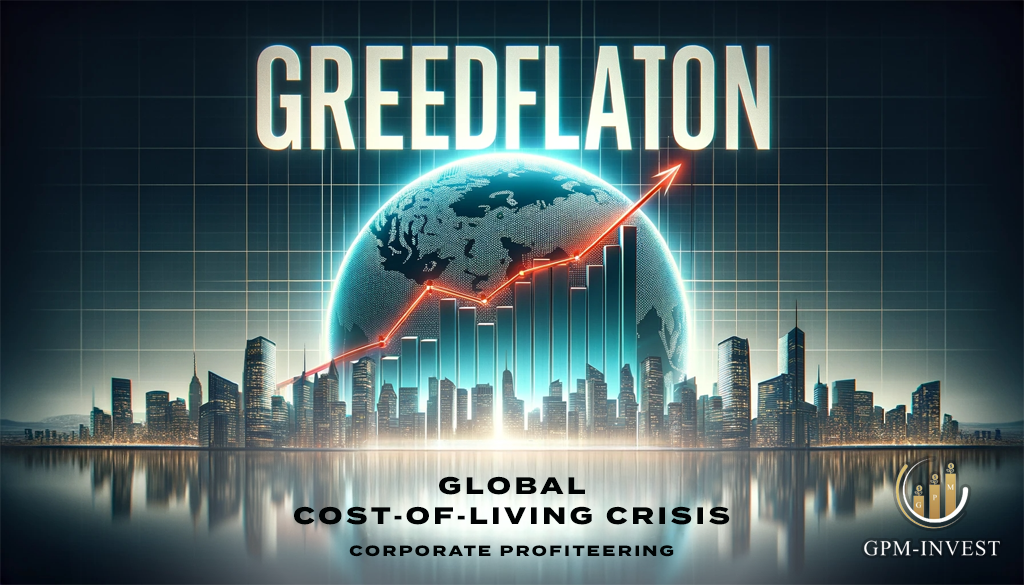Greedflation: Corporate Profiteering Escalated Global Cost of Living Crisis
By the Digital Zeitgeist, Geopolitical and Financial Analyst based in the UK
The Unseen Force Behind Inflation: Corporate Greed
A recent study by the IPPR and Common Wealth think tanks exposes a disturbing trend in the global economy: ‘Greedflation’. This phenomenon refers to corporations, especially multinationals, exploiting their market dominance to drive prices up significantly beyond their cost increases. This practice has played a pivotal role in inflating global prices, exacerbating the cost-of-living crisis, and influencing inflation rates unseen since the early 1980s.
Staggering Profit Margins at the Cost of the Economy
The study, which scrutinised the financial accounts of many of the UK’s leading businesses, reveals a startling disparity. Profits among UK-listed firms soared by 30%, primarily fuelled by a mere 11% of companies that capitalised on their market power to implement substantial price hikes. This trend wasn’t confined to the UK; the US saw even larger profit margins, dominated by a few influential companies in critical sectors of the economy.
The Wage-Inflation Imbalance
While corporate profits surged, wage increases lagged significantly behind inflation. This imbalance led to the most substantial decline in workers’ disposable incomes since the Second World War. The energy sector, particularly companies like ExxonMobil and Shell, along with food and commodities businesses such as Kraft Heinz, experienced profits that vastly outstripped inflation, further fuelling the economic strain.
The Ripple Effect of Energy and Food Prices
The aftermath of Russia’s invasion of Ukraine saw an increase in energy and food prices, which have significant knock-on effects across all economic sectors. This situation was worsened by the market power of a few companies, leading to prolonged and heightened inflation.
Technology, Telecommunications, and Banking: Not Immune to Greedflation
The analysis, which included 1,350 companies across various nations, also highlighted significant price increases in the technology, telecommunications, and banking sectors. These industries, too, have leveraged their market power to protect or even enhance their profit margins.
Systemic Sectors: The Amplifiers of Inflation
Carsten Jung from the IPPR, referencing the work of economist Isabella Weber, points out that ‘systemic sectors’—industries with outsized market influence—can significantly amplify inflation across the broader economy.
Case Studies: The Alarming Profit Increases
- ExxonMobil: Profits skyrocketed from £15bn to £53bn.
- Shell: Profits rose from £16bn to £44bn.
- Glencore: A jump from £1.9bn to £14.8bn.
- Archer-Daniels-Midland: Profits increased from £1.4bn to £3.16bn.
- Kraft Heinz: Profits grew from £265m to £1.8bn.
The Global Impact: Economic Stagnation and Reduced Labour Income
This corporate dominance is not without global consequences. The report suggests that global GDP could be 8% higher absent this rise in market power. Moreover, labour income is likely significantly lower, and economic dynamism is stifled, leading to reduced consumer choice, poorer product quality, and fewer economic opportunities.
Acknowledgement from Central Banks
Members of the US Federal Reserve and Isabel Schnabel of the European Central Bank have recognised that profit increases have been a major driver of domestic inflation, contributing more than historically noted.
The Need for Regulatory Intervention
Jung and Chris Hayes from Common Wealth advocate for taxation on the estimated $4tn of excess global profits. This move, coupled with actions to dismantle monopolistic practices, is seen as crucial to curbing the exploitative market power of these corporations.
Conclusion: A Call for Action
The Bank of England and other global financial institutions are urged to address ‘Greedflation’ proactively. The need for comprehensive strategies to combat corporate profiteering and its ramifications on the global economy is more pressing than ever. As the world grapples with unprecedented inflation rates, the role of corporate greed in exacerbating the crisis cannot be overlooked. This report sheds light on the urgent need for global economic reform, highlighting the necessity of a more equitable and sustainable economic model.
Disclaimer: The views and opinions expressed in this article are those of the author and do not necessarily reflect the official policy or position of GPM-Invest or any other organisations mentioned. The information provided is based on contemporary sourced digital content and does not constitute financial or investment advice. Readers are encouraged to conduct further research and analysis before making any investment decisions.

